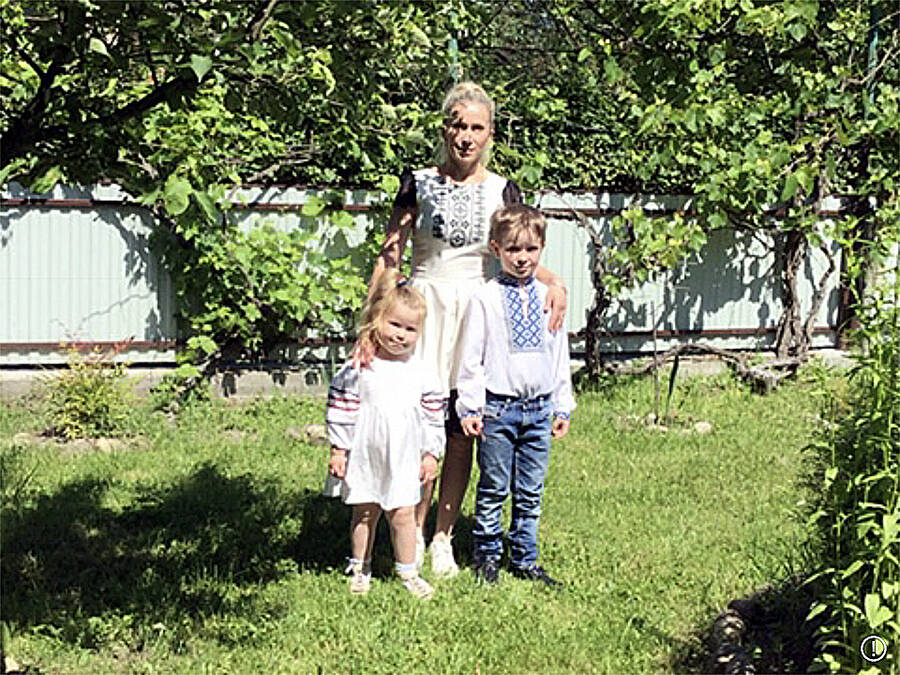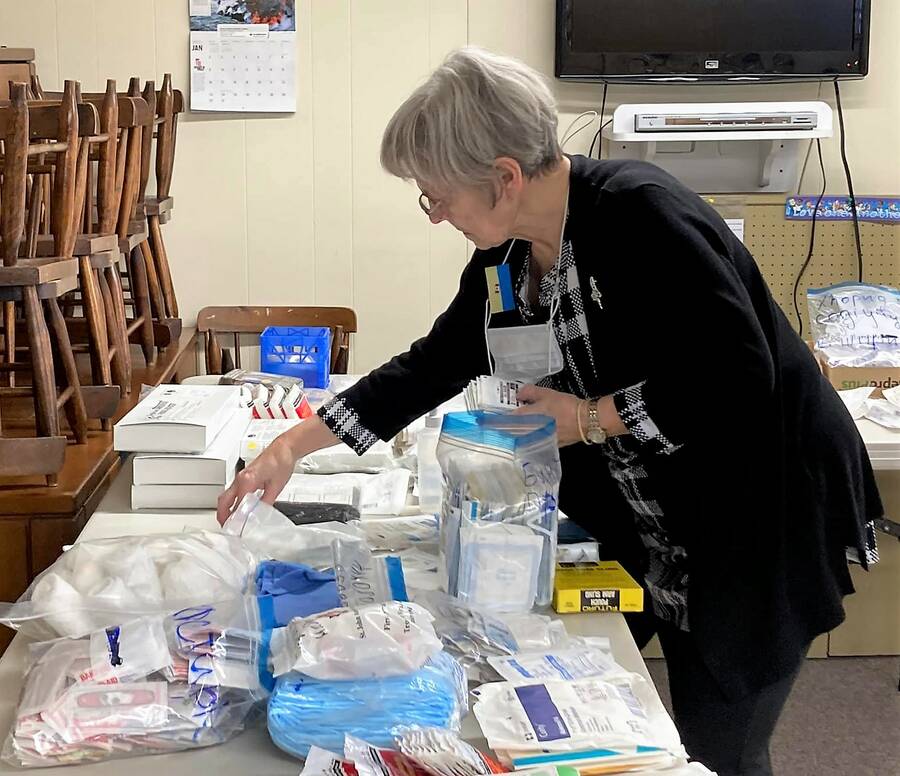
2022-03-16
Locals look to help as war in Ukraine continues
by GAYLE WILSONMembers of the local community, including those who settled here from Ukraine, have been desperately trying to lend what support they can following the Russian invasion of Ukraine on Feb. 20.
"We just thought we needed to do something," said Tammy Crouse, who has been helping to organize a donation drive, based out of St. Paul's Evangelical Lutheran Church in Bridgewater.
Crouse said she has friends with relations in Ukraine, who have "no power. Probably, at this point, no food. Bombings happening all around."
Earlier this month Crouse orchestrated a donation drive that saw a 14-foot cube van provided by Gerhardt Trucking outside of Lunenburg almost filled with boxes of donated items from Bridgewater, Mahone Bay and Liverpool, bound for Ukraine.
The items were delivered to Topaz Transport Inc. in Hammonds Plains, which in turn delivered them to a company in Ontario, Meest Corporation Inc. Founded in 1989, Meest says on its website that it aims to unite the Ukrainian diaspora in Canada "with the homeland."
Crouse reflected on how people have come together to help those in Ukraine.
"COVID seemed to tear us apart. And this seems to be reuniting people," she told LighthouseNOW.
"There certainly are people from St. Paul's that are there, but there are people from other churches. There are people that have never been to church before, just pulling together."
She said a UN-NATO veterans group from Halifax came and made a donation, while some of those volunteering with the drive are Ukrainian, Russian or from other ethnic backgrounds.
"I don't think I ever thought of Bridgewater as having that kind of an international presence, a multi-cultural presence," said Crouse.
Crouse said that the plan was to send the supplies into Lviv in western Ukraine, however, she was quick to add, "understand it's ever changing."
"But there's still a lot moving into Poland. From Poland they're going by truck to the border and then Ukrainian families here are messaging with Ukrainian families there and organizing distribution - not so much distribution as much, but getting items into distribution centres that might be run by other organizations, such as Ukrainian organizations."
Crouse said because of transport issues they are strategizing more on the types of donated items they are seeking. For example, they are no longer accepting clothing, but rather requesting basic medical supplies, such as Tylenol, Advil and Aspirin, and basic supplies for the members of the military such as warm, large-size socks, military-grade boots and yoga mats for sleeping on.
Crouse indicated the drive will be accepting donations every Friday evening and Saturday morning until the end of March. There is a list of items requested on the campaign's Facebook page at Help for Ukraine - Bridgewater Area https://www.facebook.com/groups/490562102731161
Nataliia Belcher, a single mother of two who works at Michelin in Bridgewater, hails from Ivano Franksk, near Lviv in western Ukraine. She's been helping Crouse and her team translate the lists of items that accompany each donated box.
A former logistics manager in Ukraine, she lived in Ukraine's capital, Kiev, for five years and has travelled throughout the country, including to Donetsk and Mariupol.
Her parents, sister and her husband and their children, and life-long friends are still in Ukraine. While she says she's normally not on social media a lot, she's been using Facebook and Messenger regularly to track family and friends, "and make sure they're all still alive. Just trying to connect people if somebody needs help."
When LighthouseNOW caught up with Belcher last week, she was able to report, "So far, everybody's still there."
However, she noted that the Ivano Franksk airport had come under attack by the Russians.
"I called my baby sister and outside she's showing me on camera sky with jets."
Even though initially western Ukraine has remained relatively quiet amid the turmoil of the rest of the country, Belcher said air raid sirens regularly shrill or church bells ring in the villages, signalling possible air attacks.
"No matter what time she calls me, she says, 'We run to bomb shelter.' I sit and wait and wait until she calls me back."
Belcher said everybody, including her six-year-old nephew, knows what to do when the sirens go off.
"He gets dressed in under 30 seconds in the middle of the night. He gets dressed very fast and he'll run."
She said her uncle has a cold room in the basement which has become their bomb shelter.
"And he runs by himself. He's not waiting for his mother. He knows where he has to go. It's heart breaking."
Belcher was due to fly to Ukraine in June for her godson's wedding.
"It's painful to be here," she admits, with emotion in her voice. If circumstances were different, "I would go there any minute" to help out.
"But I have two little children and I can't do that as a mother. So I will try to help out here as much as I can," said Belcher.
Meanwhile, Julia Burina is another Ukrainian who settled in Canada, in 2015 along with her husband and son.
The family hails from Luhansk, which is now recognized by Russia as an independent state.
The three came to Canada, Burina told LighthouseNOW, "because our city was invaded by Russians. And it was not safe to stay." As well, she said, "We cannot accept that another country just invaded Ukraine and decided to take it over."
The family first arrived in New Brunswick. Burina, who had been a regional manager for Metropolitan Life Insurance Company in Ukraine, went on to receive her master's degree in economics from the University of New Brunswick, while their son attended New Brunswick Community College and studied business administration.
Her husband worked as a labourer, but now owns a small company in Nova Scotia, while Burina is now the manager of Scotiabank's branch in Bridgewater.
Like Belcher, the family still has close relatives in Ukraine. While Burina's parents have since passed, her husband's family is in Kharkiv, while he has an aunt in Luhansk.
They've been communicating with the family members, who are all living in the same apartment in Kharkiv, via Facebook and Messenger.
"It's real bad. It's like (24-hour) shelling. It's a real war, so they cannot step out of the apartment. They cannot go anywhere. Yeah, it's bad," Burina emphasized.
She said the family will try to evacuate, but it's difficult for a number of reasons. Her husband's parents are in their 70s. "They don't want to go far away, of course." Even if they did, the evacuation routes have come under fire.
Like Belcher, Burina believes the economic sanctions imposed upon Russia, Putin and the oligarchs are helping.
"Oh my God, absolutely," she commented. "It's a disaster for Russia. Definitely. However, she said the problem is it will take time. "It's not going to be immediate. A result, people are still dying every day because of war. But it definitely helps."
In the meantime, Burina encouraged people to donate to the Red Cross campaign for humanitarian aid to Ukraine, noting it is still quite active in the occupied areas.






